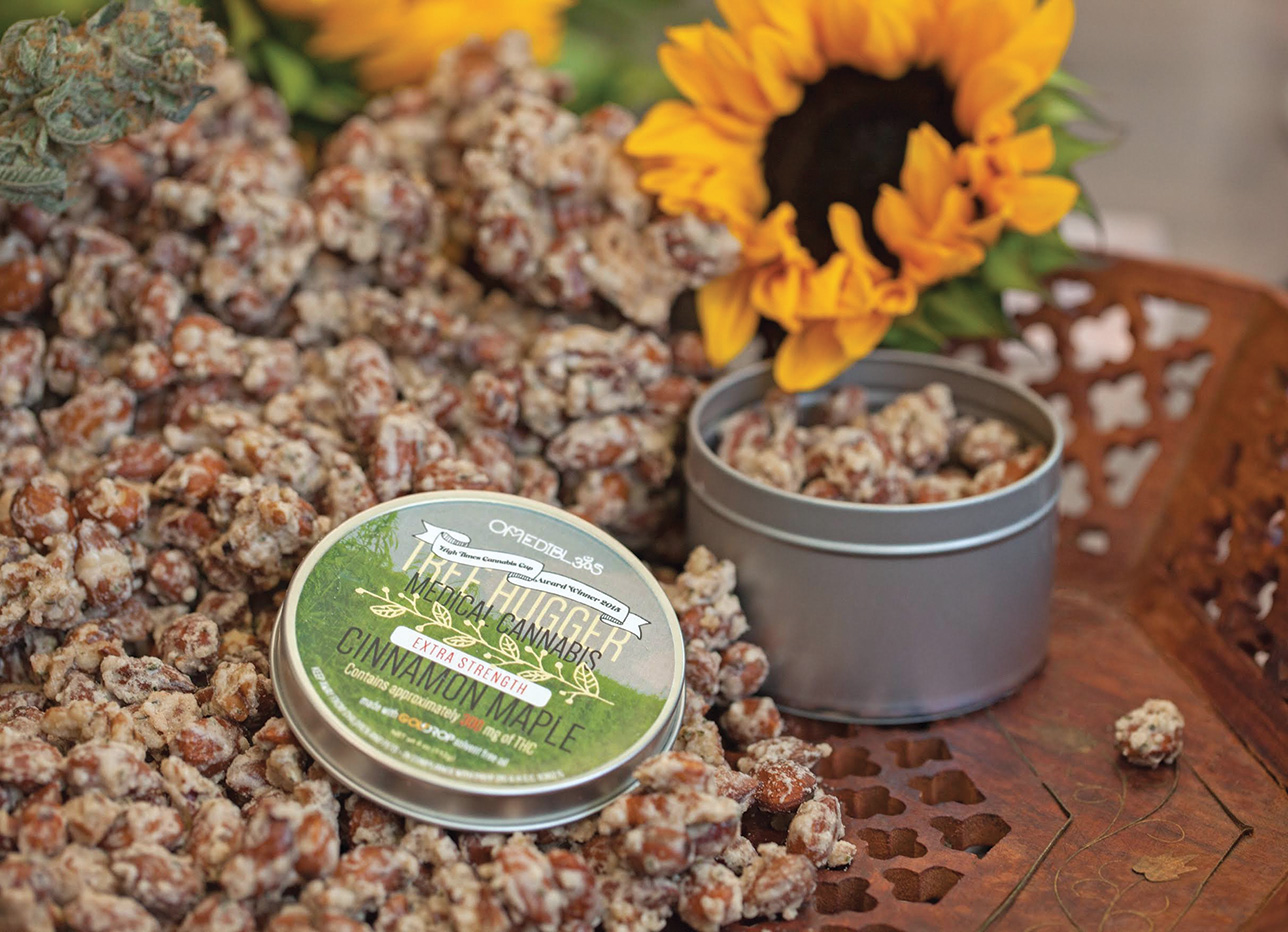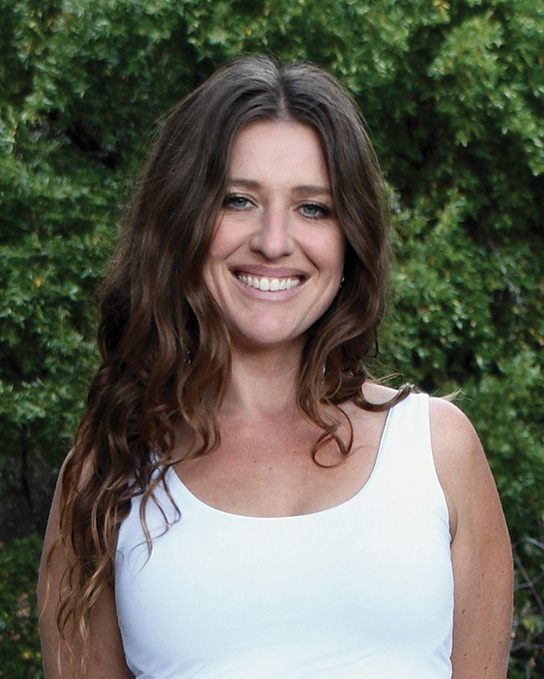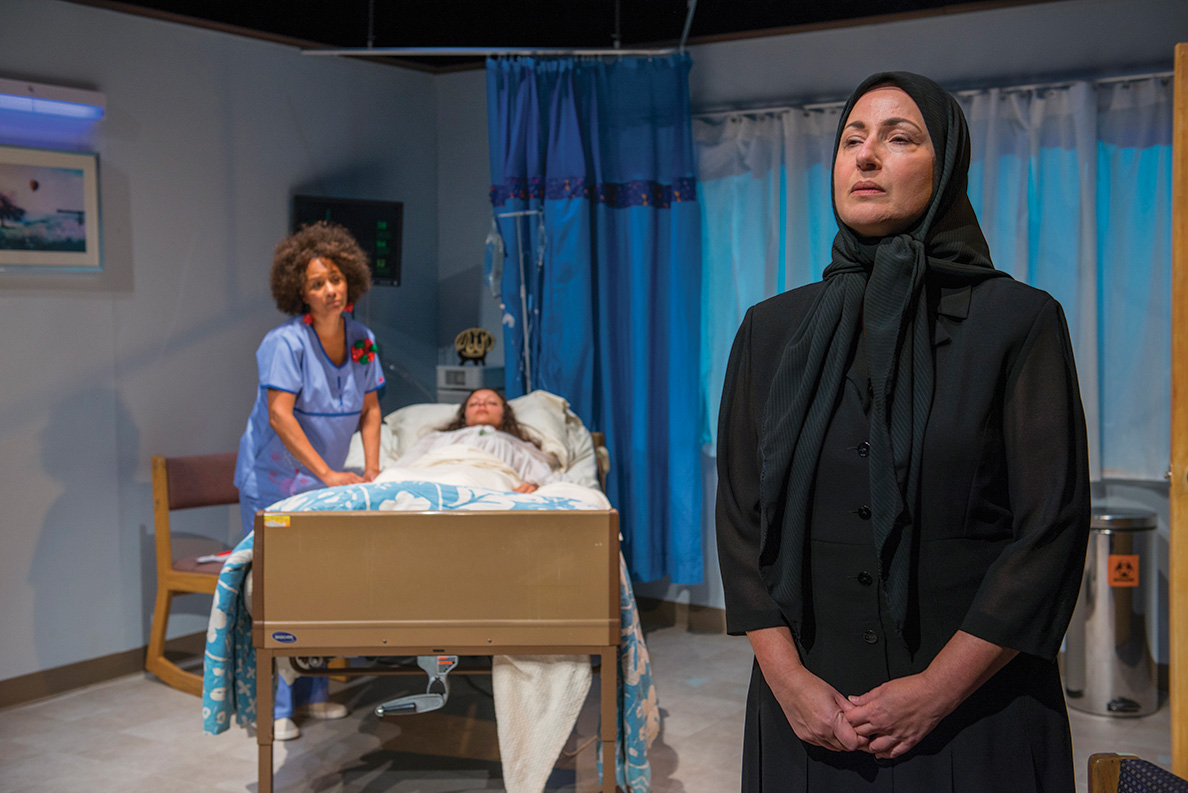Pot of Gold

In the past 10,000 years, humans have devised all kinds of interesting uses for cannabis (beyond the one people tend to think of first). It’s been a source of animal feed, fiber for clothing and even bowstrings for ancient Chinese archers. But for entrepreneur Maya Elisabeth (B.A., ’06), cannabis has provided something very different: a career that recently landed her in business with actor Whoopi Goldberg.
An unabashed pot proponent, Elisabeth considers it a nearly magical substance. “There are so many layers to cannabis,” she says. “She’s so generous. She eases pain and uplifts moods and energy.”
Elisabeth first made industry news as founder of Oakland-based Om Edibles, a medical cannabis collective run entirely by women. Launched in 2008, the company produces 15 cannabis-based products, from olive oil to bath salts, distributed through medical marijuana dispensaries. Her business reputation — and ambition — took off after she entered the 2011 High Times Cannabis Cup competition, winning third place with her peanut butter and puffed rice truffle covered in Belgian chocolate.
“I definitely knew I always had a little bit of a competitive streak,” she says. “This woke something in me.”
Om Edibles’ organic products went on to capture prizes at top industry tradeshows. And the company experienced another growth spurt after a phone call from a Cannabis Cup colleague. Would Elisabeth take a meeting with a celebrity interested in developing a cannabis treatment for menstrual pain? Elisabeth agreed and was soon on a flight to the East Coast to meet Whoopi Goldberg.

“She was really nice,” says Elisabeth, who confesses to being starstruck beforehand. “She’s got a heart of gold and believes in doing service work.”
Goldberg has a family history of painful periods. Over-the-counter medications offered little relief, but smoking pot did.
After giving up smoking years ago, Goldberg was looking for other cannabis remedies. Her conversation with Elisabeth led in 2016 to the formation of their “ganjapreneur” business partnership, Whoopi and Maya.
The team’s four offerings — including an epsom salt soak, a tincture, a rub and drinkable cacao — are formulated to provide relaxation, not the intoxication associated with smoking marijuana.
As a psychology major at SF State, Elisabeth never envisioned becoming a CEO. She simply wanted to work with people. When a college roommate got her a job at a San Francisco dispensary, Elisabeth instantly loved the work.
“We served recovering addicts and people with cancer, MS, insomnia, eczema, psoriasis, [autism spectrum disorder], epilepsy,” she explains. “My first question was: Have you ever been high before, and do you like the feeling?” From there, she’d recommend the appropriate product. The dispensary itself offered only one edible, called “Mama’s cookie dough.”
In the three years Elisabeth worked there, she began developing her own recipes. When the dispensary closed, she stepped gamely into the culinary cannabis market.
“Maya is a great example of how SF State fosters changemakers,” says School of Public Affairs & Civic Engagement Associate Professor Sheldon Gen. He and his graduate students recently released a study recommending ways California cities can put tax revenue generated by legal marijuana sales — estimated to grow to $5.7 billion by 2021 — to use for the public good, particularly by investing in programs supporting children.
Given her company’s ongoing growth and that of the industry, Elisabeth says she and her colleagues see “huge opportunity” for the state.
“We are hoping and praying,” she says, “that California will set up the regulations in a way that benefits the entire community.”
Connecting Threads

Heart surgeon or thespian? A young Torange Yeghiazarian (M.A., ’97) could have gone either way. Though she earned a bachelor’s in clinical science from another university, she later decided to focus on transforming hearts on the stage rather than an operating table. Just two years after enrolling in SF State’s graduate theatre arts program she founded Golden Thread Productions, the first theatre company in the U.S. to focus exclusively on tales centered on the Middle East.
“We have put the Middle East on American stages,” says Yeghiazarian (who has Armenian roots, was born in Iran and immigrated at 14 to Massachusetts). “The term ‘Middle Eastern-American theatre’ was something people laughed at 20 years ago. Now it’s an [accepted] term.”
Today Yeghiazarian serves as the San Francisco-based, 21-year-old theatre company’s executive artistic director, still using skills she acquired during her studies at SF State.
“It gives you great practical training,” she says of the graduate theatre arts program. “It’s not just theory.”
Three faculty members made indelible impressions evident in Golden Thread’s mission: Camille Howard, Larry Eilenberg and Mohammad Kowsar (B.A., ’66), who passed away in January. Yeghiazarian credits Eilenberg with encouraging her to take a “life-changing” workshop on creating political theatre. The overall lesson, she says, was the importance of “being vocal, being an activist artist, being a citizen of the world.”
The proof appears on stage in such shows as an antiwar musical-fantasy and a drama set in a Syrian-German woman’s kitchen.
“In our plays, you go inside people’s homes and hearts,” explains Yeghiazarian, who wrote or directed some of those plays herself. “You get to meet them as human beings who are three-dimensional. People welcome those opportunities and are surprised by how deeply they connect with those narratives.”
“She’s exactly what we hope will emerge from academic theatre training,” Eilenberg says, “which is a deeply informed and committed theatrical artist.”
A Gifted Competitor
Healthy competition? Ever present in the life of Patti Zuppan-Hood (M.S., ’92). Good health? Never a given. Born in 1964 with cystic fibrosis (CF), a disease producing thick, sticky mucus that damages organs, Zuppan-Hood’s every activity required extra steps and precautions. Life expectancy when she was a child? Maybe 10 years. Defying doctors, however, her parents encouraged her to stay active.
“I’m very muscular,” says Zuppan-Hood, 53. “I’ve exercised my entire life.”
Athleticism paid off in longevity — and five gold medals for swimming in the summer 2017 World Transplant Games in Spain.
CF fanned Zuppan-Hood’s early fascination with science, leading her to study cell and molecular biology at SF State. Approachable, deeply knowledgeable faculty members such as Biology Professor Michael Goldman and Emeritus Professor of Biology John Stubbs attracted her to the graduate program that prepared her for a successful pharmaceutical research career. (She also met Ken Hood, her husband of 28 years, in the program.)
But Zuppan-Hood’s zestful spirit couldn’t fend off CF indefinitely. By May 2014 she needed a double lung transplant, and two months later she underwent a successful procedure thanks to lungs from a 34-year-old donor.
“I’m very appreciative,” says Zuppan-Hood, who wears around her neck a miniature pewter set of lungs. “I’m just trying to maximize [the gift] and do the donor proud.”
Swimming in the World Transplant Games amplified her gratitude — and competitive nature. With few expectations, but months of training, Zuppan-Hood hopped on the poolside starting block in Malaga, Spain, fearing defeat.
“I just zoomed out and finished the race — and I was first,” she recalls. “It was extremely exciting.”
.jpg)